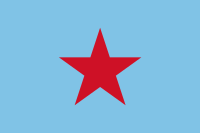Yemeni Socialist Party
The Yemeni Socialist Party (Arabic: الحزب الاشتراكي اليمني, al-Hizb al-Ishtiraki al-Yamani, YSP) is a political party in Yemen. A successor of Yemen's National Liberation Front, it was the ruling party in South Yemen until Yemeni unification in 1990. Originally Marxist–Leninist, the party has gradually evolved into a democratic socialist opposition party in today's unified Yemen.[2][3]
Yemeni Socialist Party الحزب الاشتراكي اليمني | |
|---|---|
 | |
| General Secretary | Abdulraham Al-Saqqaf |
| Founders | Abdul Fattah Ismail, Ali Nasir Muhammad, Ali Salem al Beidh |
| Founded | 1978[1] |
| Preceded by | Unified Political National Front Organisation |
| Headquarters | Aden, Yemen |
| Ideology | Arab socialism Arab nationalism Social democracy Democratic socialism Factions: Marxism Before 1990: Communism Marxism–Leninism |
| Political position | Centre-left to Left-wing (with Far Left factions) Before 1990: Far-left |
| International affiliation | Progressive Alliance Socialist International |
| Colours | Red |
| House of Representatives | 8 / 301 |
| Party flag | |
 | |
| |
History
South Yemen
The party was established by Abdul Fattah Ismail in 1978 following a unification process of a number of Yemeni revolutionary groups in both South and North Yemen. The core of the YSP came from the Unified Political National Front Organisation – itself the result of merging three parties, namely the National Front for the Liberation of Occupied South Yemen (NLF), the Democratic Popular Union Party (Marxist) and the Popular Vanguard Party (a left-wing Ba'athist party), and from the Yemeni Popular Unity Party in North Yemen – itself the result of merging of five left-wing organisations, namely the Revolutionary Democratic Party of Yemen, the Popular Vanguard Party in North Yemen, the Organisation of Yemeni Revolutionary Resistors, the Popular Democratic Union and the Labour Party.[4] The sole legal party in the country, it won all 111 seats in the parliamentary elections in December 1978.
In power, the YSP was beset by internal divisions. In 1980 Ismail was replaced as President of South Yemen by Ali Nasir Muhammad, who was a more moderate and conciliatory leader compared to the pro-Soviet leftism of Ismail. He sought to improve relations with South Yemen's Arab neighbours and the West. Conflict between the two factions led to the South Yemen Civil War in 1986 which led to the death of Abdul Fattah Ismail, although his ally Ali Salem al Beidh took control of the party, while the more moderate Haidar Abu Bakr al-Attas became president. Al-Beidh and al-Attas would occupy positions in the government of a reunified Yemen until the 1994 civil war. Parliamentary elections were held in October 1986, and although the YSP remained the sole legal party, independent candidates were allowed to contest the elections, winning 40 of the 111 seats, with the YSP winning the other 71.
Unified Yemen
Surviving many upheavals and civil strife in Yemen, the collapse of the Soviet Union, and the crisis of international socialism, the YSP was instrumental in achieving Yemeni unity and the establishment of multi-party democracy in the Republic of Yemen in May 1990.[2] In the first parliamentary elections in unified Yemen in 1993, the YSP won 56 of the 301 seats, finishing third behind the General People's Congress (GPC) and al-Islah. The three parties subsequently formed a coalition government.[5]
Following the 1994 civil war the party's infrastructure and resources were confiscated by the GPC government and its cadres and members were regularly subjected to unwarranted arrests and torture. It boycotted the 1997 parliamentary elections,[5] and was unable to nominate a candidate for the 1999 presidential elections, as any potential candidate required the backing of 31 MPs. In 2002 it was one of five parties to form the Joint Meeting Parties opposition alliance,[5] it returned to contest the 2003 parliamentary elections, it received only 3.8% of the popular vote and won eight seats.[6]
The Joint Meeting Parties nominated Faisal Bin Shamlan as their candidate for the 2006 presidential elections. However, he was defeated by the incumbent President Ali Abdullah Saleh of the GPC.
Ideology
The main strands constituting the composite ideology of the YSP are pan-Arab nationalism, Marxism, and social democratic trends.
General Secretaries
- Abdul Fattah Ismail (1978–1980)
- Ali Nasir Muhammad (1980–1986)
- Ali Salem al Beidh (1986–1994)
- Ali Saleh Obad (Moqbel) (1994–2005)
- Yasin Said Numan (2005–2015)
- Abdulraham Al-Saqqaf (2015–present)
Electoral history
South Yemeni parliamentary elections
| Election | Party leader | Votes | % | Seats | +/– | Position | Government |
|---|---|---|---|---|---|---|---|
| 1978 | Abdul Fattah Ismail | 596,787 | 100% | 111 / 111 |
Sole legal party | ||
| 1986 | Ali Salem al Beidh | 71 / 110 |
Sole legal party |
House of Representatives elections
| Election | Party leader | Votes | % | Seats | +/– | Position | Government |
|---|---|---|---|---|---|---|---|
| 1993 | Haidar Abu Bakr al-Attas | 413,984 | 18.54% | 56 / 301 |
Opposition | ||
| 1997 | Boycotted | 0 / 301 |
Extra-parliamentary | ||||
| 2003 | Ali Salih 'Ubad Muqbil | 277,223 | 4.69% | 7 / 301 |
Opposition | ||
See also
References
- Frank Tachau (1994) Political parties of the Middle East and North Africa, Greenwood Press, p638
- Victoria Clark (2010) Yemen: Dancing on the Heads of Snakes, Yale University Press
- Political Program of Yemeni Socialist Party Sahafa, 21 July 2010, 18 March 2013 Archived 1 March 2014 at the Wayback Machine
- Ahmed, Mohammed Ghaleb (29 November 2012). "عضو المكتب السياسي للحزب الاشتراكي محمد غالب أحمد ل"26سبتمبر":الثلاثون من نوفمبر1967حققه تلاحم وكفاح وتضحيات المناضلين من كل اليمن" [Letter from Politburo member Mohammed Ghaleb Ahmed to "26th September" Newspaper on achievements of 30th November 1967.]. 26 September (in Arabic). Archived from the original on 3 December 2012.
- Robert D. Burrowes (2010) Historical Dictionary of Yemen, Rowman & Littlefield, p450
- The Yemeni Socialist Party Issues its first Statement New Yemen, 3 July 2012